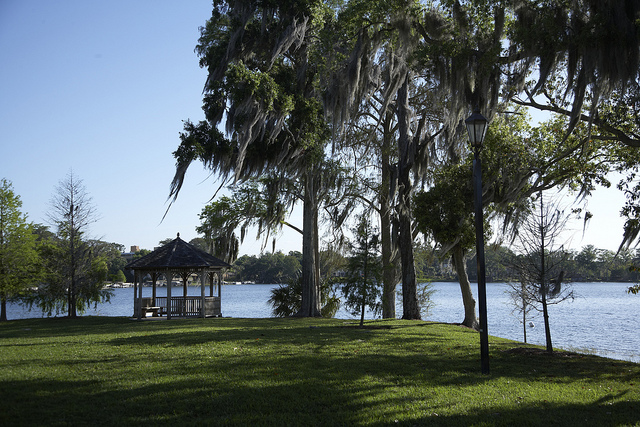Rollins’ Alfond swimming pool requires a slew of chemicals to maintain a safe and sanitary environment for swimmers and sunbathers, but this summer one of the chemicals that protects swimmers proved dangerous for the surrounding environment. At 6 p.m. on July 31, 50 gallons of liquid chlorine spilled onto the ground and into Rollins’ own Lake Virginia.
According to the official incident report from the Florida Department of Environmental Protection’s State Watch Office, the leak was caused by lack of maintenance on the pipes within the pool’s chlorine delivery system. The Center for Disease Control considers quantities over 52.83 gallons a large spill.
Nate Weyant, Rollins’ assistant Athletic Director for Strategic Communications, stated the Rollins facilities management oversees the pool’s maintenance. However, it was further clarified by Scott Rayburn, Emergency Planning Coordinator, that maintenance is contracted out to Spies Pool, LLC. The Kissimmee-based Spies Pool is a local pool contractor specializing in chemical infrastructure for commercial pools, as well as the sale of chemicals to pool owners.
Rayburn is actually the official who officially reported the leak. He said, “We notified the DEP as soon as the seriousness of the situation became clear. We also notified the National Response Center, as well as the Florida State Watch Office.” The report was made to the DEP on August 2, which is two days after the spill reportedly happened.
According to Rayburn, “[Campus Safety personnel] attempted to contain the release into Lake Virginia. [Personnel] mitigated any chlorine damage by flushing and diluting the chlorine with water.” The official report shows 15 gallons of water were used to dilute the 50 gallons of chlorine.
The student body was not made aware of this incident over the summer. When asked why, Rayburn said, “This incident occurred late in the day on August 1. No students were actually on campus. As soon as the spill was discovered, the leak was stopped.”
Leon Hayner, Senior Director of Residential Life and Explorations, said, “Very few students were on campus at that time. Only a handful who were still around, bridging from summer to fall housing.”
However, Lake Virginia is open to public use, and there were certainly members of the public using the body of water during the summer. Some students were alarmed to hear this happened and went untold to the campus and general public. Julia Simas ‘18 said, “Rollins has always prided itself in being an open and inclusive campus. Hearing this was completely shocking to me.”
Simas continued by saying, “Whenever something happens on campus, we are always included, and faculty has always said they want to hear what students have to say. But, because this happened over the summer, they swept it under the rug. Just because we aren’t here, doesn’t mean it isn’t our home, and what happens here doesn’t impact us.”
As a relatively unstable substance, the chlorine did not remain in the Lake Virginia environment for long (a fully-loaded pool will lose all of its chlorine to ultraviolet-driven dissipation in one to two days). However, the effects on the immediate environment were similar to the intended effect of chlorine in a pool: many small things dying.
Bacteria and other microorganisms near the shore would have been killed on-contact with the chlorine’s main and active byproduct, hypochlorous acid. While bacterial die off in the isolated and human-centered environment of a swimming pool is often considered a good thing, in the natural environment, these microorganisms provide beneficial services to the aquatic ecosystem, such as decomposition and an available food source.
Additionally, the hypochlorous acid eats away at the protective mucus coating the skin of all fish. When this coating is damaged, the fish are made more susceptible to infection and disease, as well as the possibility of dying from the stress of mucus loss alone. No fish deaths in Lake Virginia were reported to the DEP after the incident.
When asked what steps were being taken to prevent a similar incident from occurring in the future, Rayburn responded “(Rollins is) installing a new system that will notify the Office of Campus Safety and Facilities Management if a leak is detected.” While this will not prevent spills entirely, when added in tandem with a more robust maintenance schedule the volume of future spills, and the damage to Lake Virginia, will be minimized.







Be First to Comment